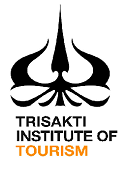The Influence of Micro-Influencers on Consumer Interest in Visiting Fine Dining Restaurants
Abstract
This study aims to analyze the influence of micro-influencers on consumer visit intentions to fine dining restaurants. Micro-influencers, with followers ranging from 500 to 5.000, are considered more authentic and trusted compared to larger influencers. The research uses a quantitative method with purposive sampling on 271 respondents who have viewed micro-influencer content related to fine dining restaurants. Data was collected through a 5-point Likert questionnaire and analyzed using SPSS and PLS-SEM. The results are expected to explain the impact of hedonic and utilitarian values of micro-influencers on consumer visit interest. These findings provide practical contributions for restaurant operators in formulating effective digital promotion strategies. The implications of this research are divided into three parts: theoretically, it strengthens digital marketing studies by showing that the hedonic aspect is more dominant than functional benefits in fine dining; practically, restaurants need to choose micro-influencers with high engagement that align with their brand image to emphasize emotional experiences; and from a policy perspective, this research could serve as input for regulators in formulating endorsement ethics by micro-influencers.
Keywords: micro-influencer, hedonic value, utilitarian value, visit interest, fine dining









